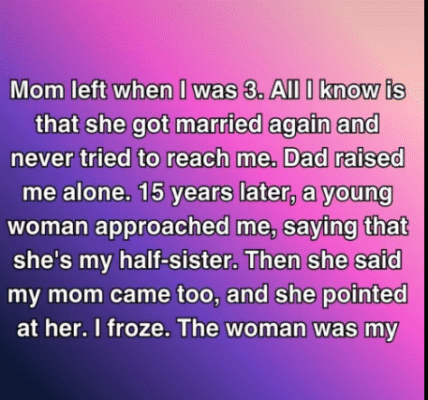My pregnant daughter showed up at my door at 5 a.m., bruised and trembling, while her husband called her “mentally unstable.”
My pregnant daughter showed up at my door at 5 a.m., bruised and trembling, while her husband called her “mentally unstable.”
I’ve spent twenty years of my life standing over dead bodies, listening to alibis that didn’t hold and lies that cracked like old paint. I’ve watched men sit in interrogation rooms and smirk, convinced they were smarter, stronger, untouchable.
I’ve never once lost a case.
But nothing in my career prepared me for the sight of my daughter on my doorstep at five in the morning.
The doorbell rang once.
I was already awake.
You don’t lose cop habits just because you retire. You still sleep light. You still catalog every creak of the house and every set of headlights that slows in front of your window.
I checked the clock on my nightstand: 4:58 a.m.
Too early for neighbors, too late for drunks.
The second ring came, followed by a hesitant knock.
I pulled on my robe and headed down the stairs. Before I even opened the door, my mind was already running scenarios—medical emergency, wrong address, maybe a kid pulling a stupid prank.
I was not prepared for Emma.
She stood under the weak porch light like some tragic figure out of a painting. Her hair, usually smooth and styled for courtrooms and client meetings, hung in damp tangles around her face. Rain clung to the shoulders of her coat. One eye was swollen, a bruise blooming ugly beneath it. Her lower lip had a split that hadn’t been cleaned yet, a thin line of darkened blood at the corner.
She was eight months pregnant, belly heavy under her coat, one hand braced against the doorframe to keep herself steady.
Her other hand trembled so violently I could see each finger shaking.
“Mom,” she whispered. “I didn’t know where else to go.”
The detective in me saw everything in one sweep: the discoloration on her wrist where someone had gripped too hard, the way she held herself like people do when their ribs hurt, the haunted look in eyes that had always been a little too stubborn to show fear.
The mother in me just saw my baby.
“Oh, sweetheart,” I breathed. “Get inside.”
I stepped aside, and she shuffled past me into the hallway. I closed the door, locked it out of habit, and then guided her into the living room. My mind was already building timelines, looking for cause and effect, cataloguing potential evidence.
Emma sank onto the couch, pulling my old afghan around her shoulders like she was trying to disappear.
Up close, the bruise was worse.
“How long ago?” I asked, gently tilting her chin so she’d look at me.
Her eyes filled with tears.
“Last night,” she said. “It… it escalated. I told him I needed space and he… he grabbed me. I tripped. Hit the table.”
She was minimizing, I could tell. Victims often do, especially when the abuser is someone they once loved, someone they still think they should protect.
“Sit,” I said. “I’m making tea.”
“I’m fine,” she protested, the old reflexive stubbornness trying to surface.
“You’re not fine,” I said. “You’re here at five in the morning.”
That shut her up.
The kettle whistled as I pulled two mugs out of the cabinet. My hands moved on autopilot. Earl Grey for me. Chamomile for her. Caffeine wasn’t going to help the panic simmering in her veins.
I brought the cups back and set one in front of her. Her phone, abandoned on the cushion, lit up with a buzz. Then another.
And another.
DANIEL WHITAKER.
Over and over again.
Emma’s shoulders flinched with each vibration like the phone was physically shocking her.
I picked it up.
“Mom, don’t,” she said quickly. “He’ll be angry if—”
“Oh, he’s already earned my anger,” I said mildly. “We might as well get introductions out of the way.”
Before she could stop me, I swiped to answer and tapped speaker.
“Emma?” His voice came through smooth and composed. It was the same tone I’d heard from hundreds of men over the years—the cultivated calm of someone who has never needed to raise his voice to get what he wants. “Baby, where are you? You left before we could finish talking—”
“This is Margaret Turner,” I said. “Emma’s mother.”
There was a small silence.
Then: “Oh. Mrs. Turner.” A soft chuckle, the kind people use when they want to sound amused, not threatened. “Is Emma there? She gets… emotional. I’m worried. Pregnancy hormones, you know?”
I looked at my daughter. Her hand tightened around the mug. Her eyes begged me not to say too much.
“She’s here,” I said. “She’s safe. We need to talk about what happened last night.”
“Nothing happened,” he said smoothly. “Emma got worked up about nothing, as she does. She’s been under stress. She… she’s not stable, Margaret. I’ve been encouraging her to get help. Honestly, I’m concerned about her ability to be a responsible mother.”
I’d never wanted to reach through a phone and slap someone as much as I did in that moment.
“You’re just an old woman,” he added, his tone slipping, arrogance seeping through. “What exactly do you think you can do to me from your living room?”
There it was.
The underestimation.
It might have stung if I hadn’t heard some variation of it for twenty years—from suspects, from defense attorneys, from rookies who thought my wrinkles meant weakness.
I smiled.
“More than you’d like,” I said. “This conversation is over. Do not contact my daughter again. Any communication from this point forward goes through her attorney or law enforcement.”
“You can’t threaten me,” he scoffed. “If she doesn’t come home by tonight, I’m telling everyone she’s unfit. I’ll have her declared unstable. You think any court will give a crazy woman custody? You’re just making this worse for her.”
“I’ve never lost a case,” I said quietly. “Goodbye, Daniel.”
I hung up.
Emma stared at me, eyes wide. “Mom…”
I turned to her.
“You did the right thing coming here,” I said. “We’re going to handle this. Step by step. But we do it smart.”
She took a shuddering breath. “He says… he says if I leave, he’ll say I’m mentally ill. That I’m dangerous. That I can’t raise a baby.”
“That’s a common play,” I said. “We’ll counter it with something better.”
“What?” she asked.
“Evidence,” I said. “And the truth.”
I used to tell new detectives that emotion is a lens that distorts everything. You can’t see clearly through tears or rage. You acknowledge those feelings, then set them gently in a chair in the corner while you work.
I did the same now, except the rage was mine.
“Start at the beginning,” I said. “As best you can. Not just last night. When did this start to feel wrong?”
Emma hesitated.
“I don’t want you to think I’m stupid,” she said.
I snorted. “You’re a lawyer who graduated top of her class. You’re eight months pregnant and you drove yourself here at four in the morning. Stupid isn’t on the table.”
She managed a rough huff that might have been a laugh if it hadn’t caught on a sob.
“It was little things at first,” she began. “Sarcastic comments. Criticism disguised as jokes. You know. ‘Are you really going to wear that to court?’ Or, ‘You sure you want to eat that?’ Stuff you can shrug off. Then he started telling me which colleagues were bad influences. That I shouldn’t talk about work. That my friends didn’t understand me like he did.”
I listened, the way I’d listened to victims in interview rooms and kitchens and hospital beds.
“He’d tell me I was overreacting when something hurt,” she went on. “Then when I stopped bringing things up, he’d call me cold. He always had an opinion on what I should feel. He started handling our money. He said I was ‘too busy’ to keep track of it. When I questioned charges, he’d get sarcastic. ‘Didn’t you say you wanted to trust me?’”
Gaslighting. Control. Financial manipulation. Emotional erosion.
“These last few months, it got worse,” she said. Her hand drifted unconsciously to her belly. “He’d tell me I was unstable. That pregnancy made me irrational. That if I was this emotional now, he didn’t know how I’d manage a baby. When I’d get upset, he’d pull out his phone and record me. ‘See? This is what you look like when you’re hysterical.’”
My jaws tightened until my teeth ached.
“Last night?” I asked.
She closed her eyes.
“I told him I needed space,” she whispered. “That I was going to stay with you for a few days. He laughed. Said I was being dramatic. When I tried to get my overnight bag, he grabbed my arm. Hard. Told me I wasn’t going anywhere. That he’d go to court and say I was crazy if I left. That my own mother would back him up when she saw how hysterical I was.”
She opened her eyes, and I saw the girl who’d once scraped her knee at the playground and tried to pretend she wasn’t hurt.
“I pulled away,” she said. “He still had my arm. I lost my balance. Hit the side table. That’s when…” She gestured to her eye. “He let go. Then he went into the kitchen and started talking loudly to his phone about how I attacked him. I grabbed my keys when he wasn’t looking and left.”
I took a slow breath, keeping my voice level.
“You did everything right once he put hands on you,” I said. “Before that? You did what most people do. You tried to love someone who was making that harder and harder. That doesn’t make you weak. That makes you human.”
She swiped at her face.
“I feel so stupid,” she said.
“That’s the bruise talking,” I replied. “Not you.”
After she showered and changed into one of my old sweatshirts, she dozed on the couch, exhaustion finally yanking her under. I pulled a blanket over her and tucked it gently around the swell of her belly.
Only then did I let myself move fully into detective mode.
I took photos of her injuries from every angle, making sure the lighting was clear. I asked her, when she woke briefly for water, to forward me the last month of texts between her and Daniel. I downloaded the call log. I wrote down her account while it was fresh, in her words, dated and timed.
Messages from him were exactly what I expected: alternating sweet apologies with condescending lectures, love-bombing and insults wrapped together.
Baby, you know I only get like that because I care.
You embarrassed me in front of my colleagues. That’s not what a stable partner does.
You’ve always been a bit dramatic. We’ll talk when you calm down.
Evidence wasn’t emotional.
Evidence was leverage.
I still had friends at the department. They were younger now, newer, but they knew my name and my record. When I retired, they gave me a plaque and a cake. They also gave me their personal numbers “just in case you ever get bored.”
I called Harper.
He picked up on the second ring.
“Margaret,” he said. “I was wondering when you’d need to rescue us from ourselves.”
“I’ve got a domestic situation,” I said. “My daughter. Eight months pregnant. Bruised. Husband with a control complex and a decent lawyer. I’ve documented injuries and texts. You available?”
“Domestic?” he echoed. His tone sharpened. “Is she safe now?”
“Yes,” I said. “But he’s already started the ‘emotionally unstable’ narrative. I want this handled before he builds too much of his own.”
“You want uniforms out there?” he asked. “Or you want me first?”
“You,” I said. “He’s the smooth type. Prefers an audience.”
“I’ll be there in an hour,” Harper said. “Send what you’ve got to my email.”
I did.
By noon, Daniel’s black BMW turned onto my street.
He parked across the road and got out, jaw clenched. Even from my living room window, I could see the effort he was putting into smoothing his expression. The polished calm. The “I’m the reasonable one here” posture.
Men like him believed deeply in appearances.
I opened the front door before he could ring the bell.
“Margaret,” he said, smiling with just the right amount of concern. “Thank God. I’ve been worried sick.” He glanced past me into the house. “Where’s Emma? She ran out in the middle of—”
“She’s resting,” I said. “She’s safe. You and I are going to talk out here.”
He stepped toward the door.
I stepped into his path.
“Excuse me,” he said, his tone darkening a shade. “She’s my wife. I have a right to see her.”
“What you have,” I said calmly, “is the right to remain outside my home unless she invites you in. She hasn’t.”
His nostrils flared.
“You’re overstepping,” he said. “This is a marital issue. You can’t involve the police just because you’re angry.”
“Oh, I’m not angry,” I replied. “Anger’s loud. I’m quiet. That’s what you should be worried about.”
His mask slipped for a moment, annoyance flickering.
“What do you want?” he snapped.
“First,” I said, “I want you to know this conversation is being recorded.” I held up my phone. “Second, I want you to understand that from a legal standpoint, this stopped being a ‘marital issue’ the moment you put your hands on my daughter hard enough to leave a bruise.”
He opened his mouth, but I kept going.
“I’ve been a homicide detective for twenty years, Daniel,” I said. “I’ve seen exactly where these patterns go when no one intervenes. This?” I pointed to the faint discoloration just visible along Emma’s collarbone through the living room curtain. “This is where it starts. And I will not let it end where I’ve seen it end too many times.”
“You’re being dramatic,” he said, looking around to see if any neighbors were watching.
They were.
“Emma is unstable,” he added, louder, as if projecting the narrative. “You know she is. You’ve seen it. She’s always been emotional.”
“Careful,” I said. “If you’ve spent this much time telling a cop’s daughter she’s crazy, that’s going to sound a lot more like projection in court.”
He took a step closer.
I shifted my stance without thinking—feet planted shoulder-width apart, weight balanced. It wasn’t a conscious decision. It was muscle memory from decades of making sure I couldn’t be pushed taller than I wanted to be.
“You can’t stop me from—” he began.
The sound of a car pulling up cut him off.
Harper stepped out of the unmarked sedan, suit jacket over his arm, badge clipped to his belt. Behind him, a patrol car pulled in and parked at the curb.
“Daniel Whitaker?” Harper called.
Daniel turned, annoyed, then caught sight of the badge.
His face changed.
“What is this?” he demanded.
“My name is Detective Harper,” he said. “We’ve received a report of domestic violence. We’d like to ask you some questions.”
“This is ridiculous,” Daniel said, glancing between us. “She’s manipulating you. She’s always been manipulative.”
“Who?” Harper asked mildly. “The eight-month pregnant woman with the black eye? Or the retired detective with a twenty-year record and a folder full of time-stamped photographs and text messages?”
Daniel’s jaw worked.
“You have no right to—”
“Actually,” Harper said, “we do. And you’re welcome to call your attorney if you’d like.”
Daniel sputtered.
Harper nodded to the uniformed officer, who opened the car door and took a step forward, just enough to change the energy.
“Mr. Whitaker,” Harper said. “You are not under arrest at this moment. But we are serving you with a temporary protective order. You are to have no contact with Emma Turner. Any communication goes through counsel. You will vacate the marital residence. Failure to comply will result in immediate arrest. Do you understand?”
A rustle came from the doorway.
Emma stepped outside, one hand on the frame for support, the other resting on her belly.
Her face, even bruised and tired, was beautiful in that way all women are when they’re standing up after being pushed down.
Daniel’s expression twisted when he saw her.
“Emma, tell them,” he said. “Tell them you overreacted. Tell them you’re under stress and your mother is making this worse.”
She met his gaze.
For a moment, fear flickered. I saw the old dynamic, the conditioned response, the urge to appease.
Then something else moved through her.
“No,” she said. Her voice was quiet but steady. “I told them the truth.”
It was a simple sentence.
But in my experience, those are the ones that change cases.
Harper watched Daniel carefully.
“You’ll receive further information about court dates,” he said. “In the meantime, I strongly suggest you comply with the order and find other accommodations.”
Daniel’s bravado wilted in the cold air.
“You’re all making a mistake,” he said sharply. “You’ll see. She’s crazy. She’s always been crazy.”
“Crazy enough to come here instead of stay and be your punching bag,” I said. “Smart choice, I’d say.”
His eyes narrowed.
“This isn’t over,” he hissed.
“Correct,” I said. “It’s just beginning. That’s what should scare you.”
The next days moved in that strange double-time grief and crisis always seem to follow—both too fast and excruciatingly slow.
Harper came by with more questions. We went to the hospital for Emma’s exam. The bruise was documented. The baby, thank God, was fine, oblivious to the storm outside.
We met with a lawyer specializing in family law and domestic violence. Emma’s legal training helped; she understood the process, even if living it felt like walking through fire.
Daniel’s tactics were textbook.
He sent tearful emails, which we did not answer. He left voicemails, which we did not listen to beyond archiving them for evidence. He had his attorney suggest that Emma be evaluated by a psychologist “due to longstanding emotional instability.” Our lawyer responded with a request that he undergo an anger management assessment.
He tried to spin the narrative with mutual friends.
Some believed him. Some didn’t.
The investigation went on.
Neighbors told Harper about the shouting they’d heard in the past few months. One mentioned seeing Emma on the porch once, holding her belly, crying, while Daniel talked into his phone and gestured dramatically toward her.
Old girlfriends, tracked down by Harper’s team, admitted quietly to “minor incidents” with Daniel—nothing they’d felt safe or supported enough to report at the time, but enough to show a pattern.
Every time a piece of information came in, I wished I could go back to the younger version of my daughter and teach her to see these red flags as clearly as I did now.
But life doesn’t work like that.
You can’t solve crimes backwards.
You can only protect people forwards.
The day the judge signed the long-term protective order, Emma sat in the courtroom with her hands folded over the rise of her belly, eyes on the bench.
Daniel sat across the aisle, lawyer at his side, jaw clenched.
The judge reviewed the evidence, the hospital reports, the photos, the witness statements.
“This court finds sufficient evidence of domestic violence and coercive control,” she said. “A one-year protective order is granted. Mr. Whitaker, you are barred from contacting Ms. Turner by any means. Custody and visitation decisions regarding the minor child will be addressed in separate proceedings, and this court will view any attempts to weaponize mental health allegations with extreme scrutiny.”
Possession of the marital home went temporarily to Emma. Daniel’s face reddened.
“This is absurd,” he whispered as his lawyer patted his arm.
The gavel fell.
Outside, on the courthouse steps, Emma let out a breath I didn’t know she’d been holding.
“I can breathe,” she said.
Tears filled her eyes—this time not from fear, but from something that looked like relief.
“You and that little one deserve that,” I said.
“Mom,” she said, turning to me. “Thank you. I don’t think I would’ve…” Her voice broke. “I might have gone back. If you hadn’t… if you weren’t you.”
“You’re the one who walked out of that house,” I said. “You’re the one who stood on my doorstep. You’re the one who looked him in the eye and said, ‘I told them the truth.’ That’s you. Never forget that.”
She hugged me, sobbing into my shoulder.
For a moment, she was four years old again, terrified of thunder, letting me tell her that storms always pass.
This storm would, too.
The baby came three weeks later.
Everything about that day was loud—monitors, nurses, doctors giving instructions—but when they handed that squalling, wrinkled boy to Emma, the whole world went quiet for me.
She named him Lucas.
Watching her hold him, rocking gently in the hospital bed, bruises faded and eyes bright, I felt something settle inside me. Maybe after all the horrors I’d witnessed in my years on the force—the scenes that left their fingerprints on my dreams—this was my balance.
Some battles follow you even after retirement.
But some victories matter more than any case you ever closed.
Months later, when I looked across the living room to see Emma laughing as Lucas kicked his chubby legs, the protective order framed on the wall not as a trophy but as a reminder that safety had been fought for and won, I realized something simple:
I used to think my legacy would be the plaques on the wall at the station. The solved cases. The men who went to prison because I refused to give up on the truth.
But my true legacy was in this house.
In a daughter who learned that she didn’t have to accept pain.
In a grandson who would grow up in a home where fear wasn’t the background noise.
Daniel once asked me, “What do you think you can do to me?”
He thought I would come after his job, his reputation, his money.
He didn’t realize that my goal was never to destroy him.
It was to make him irrelevant.
To remove him from the center of my daughter’s life and return her to herself.
That’s what I did.
Not as Detective Turner.
As her mother.
And if I could give one piece of advice to any woman who hears echoes of Emma’s story in her own, it would be this:
You are not the crazy one.
You are not alone.
And sometimes, the most powerful thing you can do is ring a doorbell that you know will open—and let someone who loves you say, “I’ve got you. We’re going to handle this. Step by step.”




